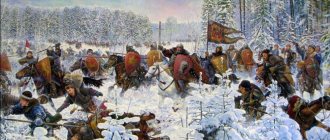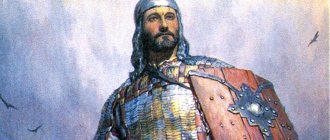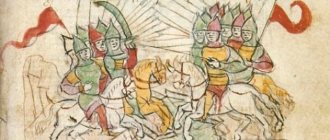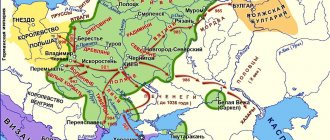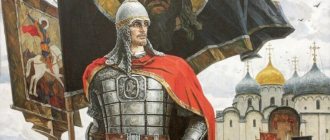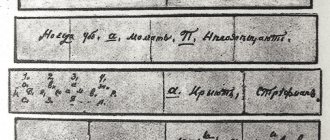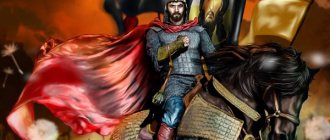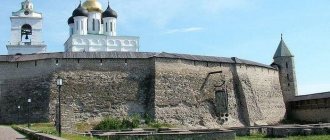Alexander Yaroslavich Nevsky was the prince of Novgorod, Kyiv and Vladimir. He became famous thanks to his victories over the Livonian Order and the Swedes. He played a subtle political game with the Horde and was able to protect his principality from the raids of Batu Khan. The prince died at the age of 42 in 1263, returning from another trip to the Horde. Most of Alexander's relics are kept in the Alexander Nevsky Lavra in St. Petersburg.
The cause of death of Alexander Nevsky was an illness that began during his stay in the Golden Horde. On November 14, 1263, returning to Vladimir, the prince died. Today, most of his holy relics are located in the Holy Trinity Alexander Nevsky Lavra.
short biography
Prince Alexander Yaroslavich Nevsky, Miniature from the "Tsar's Titular Book", 1672
Alexander Yaroslavich Nevsky is one of the most famous ancient Russian princes and commanders, the son of Grand Duke Yaroslav Vsevolodovich and the grandson of Vsevolod III the Big Nest. Having begun his history in 1236 as a defender of the Novgorod land from foreign invasions from the west, Alexander survived the invasion of the Mongol-Tatars and subsequently received from the Horde the rights, first to the Novgorod and Kiev, and then the Vladimir principalities.
Faced with the need to respond to pressure from the West and East, Nevsky chose the path of subordination and softening of the Horde policy towards Rus', but fought against the Swedes, Lithuania and the Teutonic Order, repelling their systematic attacks.
The prince rejected the Pope's proposal to convert to Catholicism and conclude an alliance with the Western powers to confront the Horde, and a few years later he himself, with threats, forced the Novgorod Republic, unconquered by the Mongols, to pay tribute to the Horde and conduct a population census at the request of the khan.
Historians often hold diametrically opposed opinions about Alexander Nevsky. Some call him an accomplice of the Horde, who conquered Novgorod for them and strengthened the tendencies towards despotic power in Rus', others imagine the prince as a defender of the Russian land, who soberly assessed the futility of resistance to the eastern invaders in the principalities devastated by the invasion. One way or another, Nevsky is one of the key figures in medieval Russian history.
Attitude of contemporaries
Alexander was the prince of Novgorod, and later of Vladimir. The activities of his father Yaroslav caused discontent among the inhabitants of Rus', since Yaroslav collaborated with the Mongols. Nevsky, in turn, remained committed to this policy. The Orthodox Church supported the commander, because during the yoke it enjoyed sufficient freedom.
Alexander managed to obtain some concessions from the Mongols. For example, reducing the volume of tribute collected from Russians.
Alexander’s relations with Western countries did not work out. The prince responded with a sharp refusal to the offer to convert to Catholicism.
The reign of Alexander Nevsky
Briefly about the essence and directions of foreign policy
Alexander's reign, in general, in the chronicles is characterized primarily by the solution of foreign policy problems. Having begun to reign independently in Novgorod in 1236, the prince already knew about the danger of invasion from the west - his father, Yaroslav Vsevolodovich, regularly repelled Lithuanian raids and fought with the crusaders on Novgorod soil. The invasion of the Mongol-Tatars in 1236-1242 claimed the lives of not only many ordinary people, but also a large number of princes; as a result, princely feuds practically disappeared, and defending Russian lands became problematic. While Yaroslav Vsevolodovich was rebuilding cities destroyed by invasion from the east, his son Alexander defended himself in the west.
In 1240, Alexander defeated the Swedes who landed on the banks of the Neva River - this event, unnoticed by the Swedish chronicles, was destined to become the reason for the prince’s nickname. On July 15, Alexander Yaroslavich was able to take the enemy camp by surprise with a surprise attack and, having suffered significant losses, the Swedes hastily boarded ships the next day.
Campaigns of Alexander Nevsky to protect the western borders 1239-1245 More about foreign policy
Nevsky also successfully dealt with the Teutons who tried to gain a foothold - he cleared the Novgorod land of enemy detachments of robbing merchants and peasants, recaptured Pskov captured by the crusaders, and then on April 5, 1242, defeated the knights in the Battle of Lake Peipsi.
In 1243, Nevsky's father Yaroslav was the first of the Russian princes to be summoned to the Golden Horde to Batu, and Alexander himself continued to hold the defense - this time from the increasing raids of the Lithuanian princes. After the death of their father in the Horde in 1246, Alexander and his brother Andrei had to go to the khans to bow and receive labels for reign. The reign of Vladimir went to Andrei, while Alexander, despite the patronage of Batu Khan, received the principalities of Kiev and Novgorod from the Mongol khans in Karakorum.
“Prince Alexander Nevsky receives the papal legates”, art. G. Semiradsky. 1876
A few years after returning from the Horde, Prince Alexander received a letter from the Pope with a proposal to convert to Catholicism and join forces with Western states to counter the Horde threat. During these same years, the Lithuanian prince Mindovg went over to the side of the Catholics, and the Galician prince Daniel agreed to be crowned with the permission of the pope. However, Nevsky rejected the offer and soon left for the Horde again. During his absence, a campaign was organized against Andrei, who reigned in Vladimir, under the leadership of the Horde military leader Nevryuy. The reasons for the campaign are unknown, but after the defeat Andrei fled to Sweden, and Alexander took his place on the grand ducal table in 1252.
Alexander, who became the Grand Duke, was able to soften the policy of the khans - during his reign there were no major destructive Horde raids, but he had to pay for it with obedience. Twice more Nevsky went to the Horde with gifts, organized a census of the population, which the khans demanded, and guarded the tribute collectors. Novgorod, unconquered by the Mongols, under the threats of Nevsky, was also forced to agree to pay tribute to the Horde and conduct a census.
Table “main events of Alexander Nevsky’s foreign policy”
| Year/event | Result |
| 1240 July 15 | Battle of the Neva - having learned about the Swedes’ intentions to land near Ladoga, Alexander gathered troops and set up a Swedish camp, forcing the enemy to retreat. |
| 1242 April 5 | Battle of the Ice - on the ice of Lake Peipus, Alexander defeated the Livonian Order and forced them to conclude a profitable peace: the Order abandoned all recent conquests and ceded part of Latgale to the Novgorodians |
| 1245 | Lithuanian campaign - in response to the capture of Torzhok and Bezhetsk by the Lithuanians, Alexander first took Toropets, where the enemy took refuge, and then finished off the remnants of the Lithuanians at the lake. Zhizhitsky and near Usvyat. |
| 1247-1249 | After the death of his father, Alexander went to the Horde to Batu, then to Mongolia - as a result, he received a label for the reign of Kiev and Novgorod, and his brother Andrei became the great prince of Vladimir. |
| 1252 | A trip to the Horde - in his absence, the Horde commander Nevryu attacked Rus' and forced his brother A.N. Prince Andrei to flee. Alexander Nevsky received the right to reign in Vladimir in the Horde. Alexander refuses two cardinals from the pope who arrived in Novgorod to their proposal to conclude an alliance with Catholic forces to confront the Horde. |
| 1257 | A.N. promotes the Horde's policy in conducting a population census in Rus' and suppresses the uprising in Novgorod - opponents of the census have their noses cut off and their eyes gouged out. |
| 1259 | Threatening a Tatar pogrom, A.N. obtained consent from the Novgorodians for a census and tribute. |
| 1262 | By order of A.N. his son Dmitry and brother Yaroslav Tverskoy make a campaign against the Livonian knights and besiege Dorpat. |
| 1262 | Anti-Horde uprising in Vladimir, Suzdal, Rostov, Pereslavl, Yaroslavl and other cities - Horde tribute collectors and random “bessermen” were killed. A.N. goes to the Horde, where he negotiates with Khan Berke to pay additional tribute in return for demands for military recruitment among the residents of the Russian principalities to participate in the hostilities of the Horde. |
Brief description of domestic policy
The domestic policy of Alexander Nevsky was largely determined by the fact of the Tatar-Mongol conquest of Rus'. In an effort to strengthen the western borders, the prince built new fortresses, restored cities in the territories destroyed by the Horde invasion, but at the same time served as a governor for the horde itself - he suppressed uprisings against the policies pursued by the Mongols, fought against insubordination and continued the course of his predecessors towards the centralization of power. Separately, it is worth highlighting Nevsky’s relationship with Novgorod - the prince, having services to the city as a defender and influence on some of the local boyars, forced the freedom-loving city to submit to the demands of the Horde for the payment of tribute and a census.
General scheme of Alexander Nevsky's domestic policy Read more about domestic policy
Death
In 1262, the prince made his last trip to the invaders - Khan Berke demanded “tribute in blood” from the Russian principalities, i.e. provide warriors for the Mongol wars. Nevsky also had to justify himself for the anti-Horde pogrom that occurred that same year, during which tribute collectors were exterminated in many cities. Alexander successfully accomplished these goals, but while still in the Horde he became seriously ill, and during his return to Rus' he realized that he was dying.
Having adopted the schema under the name Alexy, he died on November 14, 1263 (there are two versions about the place of death - in Gorodets Volzhsky or in Gorodets Meshchersky). Metropolitan Kirill announced to the people in Vladimir about his death with the words: “My dear children, understand that the sun of the Russian land has set,” and everyone cried out with tears: “We are already perishing.”
“The preservation of the Russian land,” wrote the historian Sergei Solovyov, “from trouble in the east, famous exploits for faith and land in the west gave Alexander a glorious memory in Rus' and made him the most prominent historical figure in ancient history from Monomakh to Donskoy”[1]Cutting from “Russian History” by S. M. Solovyov about Prince Alexander Nevsky.
Death of Alexander Nevsky Art. G. I. Semiradsky
Initially, Alexander Nevsky was buried in the Nativity Monastery in Vladimir. In 1724, by decree of Peter I, the remains of the prince were solemnly transferred to the Alexander Nevsky Monastery in St. Petersburg.
Version of the Pope's involvement
The death of Alexander Nevsky was also beneficial to the Pope. It is known that the Catholic West, represented by Innocent IV and the knightly orders, fiercely hated Alexander. This attitude was associated with the pope's intention to subordinate all eastern churches to Rome.
Innocent IV repeatedly offered Alexander Nevsky to submit to Roman power in exchange for support in the event of an attack by the Mongols. In the West they believed in the possibility of converting Rus' to Catholicism, but Nevsky’s religion prevented these plans. The pope had representatives in the Golden Horde, who could have poured poison into the unwanted Prince Alexander.
Results and results of the board
- The prince refused the Pope's offer to join the Western Catholic world to fight the Horde.
- Throughout his reign, Alexander resisted Lithuanian raids on Russian lands, but in the end he joined forces with the Lithuanian prince Mindaugas to strike at the Teutons.
- The Novgorod land was cleared of Livonian knights, Pskov, which they had captured, was liberated, and a victory was won on Lake Peipsi.
- As a result of the Battle of the Neva, the prince drove out the Swedes who had landed on the banks of the Neva.
- An agreement was concluded with the king of Norway to settle border disputes and collect tribute.
- At the request of the Horde, Alexander conducted a census of the population of Rus'.
- Novgorod, which was never conquered by the Horde, under pressure from Nevsky, agreed to pay tribute and conduct a census
- Nevsky was able to dissuade the Horde Khan from demanding that Russian troops be provided for the Horde wars.
- He did not allow his uncle Yaroslav to be confirmed as the Prince of Novgorod.
- The son Vasily, who showed disobedience, was deprived by Nevsky of the Novgorod principality and replaced by another son, Dmitry.
- The territories damaged during the Mongol-Tatar invasion are being restored - temples and monasteries are being rebuilt, walls and towers of destroyed cities are being erected.
- A chain of small fortresses was built along the Shelon River to strengthen the western border against Lithuanian and Livonian invasions.
- In 1262, an anti-Horde uprising took place, in the organization of which Nevsky could have been involved.
Family and personal life
In 1238, the wedding of Alexander Nevsky and the daughter of the Polotsk prince Alexandra Bryachislavna took place. There is practically no information in the chronicles about the prince’s wife. In total, five children were born in the marriage:
Children
In total, Alexander had 5 children: four sons and a daughter. Two of Nevsky's sons were destined to become the great princes of Vladimir, and the younger Daniil, born just two years before Alexander's death, became the first appanage prince of Moscow.
sons
Vasily (before 1245-1271) - Prince of Novgorod; Dmitry (1250-1294) - Prince of Novgorod (1260-1263), Prince of Pereyaslavl, Grand Duke of Vladimir in 1276-1281 and 1283-1293; Andrey (about 1255-1304) - Prince of Kostroma (1276-1293, 1296-1304), Grand Duke of Vladimir (1281-1284, 1292-1304), Prince of Novgorod (1281-1285, 1292-1304), Prince Gorodetsky (1264-1304) 1304); Daniil (1261-1303) - Prince of Moscow (1263-1303), founder of the Danilovich dynasty.
Daughters
Evdokia is the wife of Prince Konstantin Rostislavich of Smolensk.
North-Eastern Rus' after Alexander Nevsky
Alexander Nevsky was the last prince to reign directly in Vladimir. After his death, North-Eastern Rus' broke up into a dozen virtually independent appanage principalities. One of the appanage princes received, under the khan's label, the great reign of Vladimir, which provided him with superiority over the others and gave him formal supremacy. The right to a great reign was assigned to the offspring of Yaroslav Vsevolodovich, and Nevsky’s son, Prince Daniil Alexandrovich, became the first appanage Moscow prince. In fact, all the great princes were directly subordinate to the khans, first of the Mongol Empire, and from 1266 - of the Golden Horde, independently collected tribute in their possessions and forwarded it to the khan.
Prince Daniil Alexandrovich of Moscow Portrait from the Tsar's Titular Book 1672 Daniil of Moscow
Origin of the nickname
Alexander Yaroslavich received the honorary nickname “Nevsky” for his victory in the Battle of Neva and personal courage shown in battle. Having learned about the landing of the Swedes on the banks of the Neva, the prince did not wait for the help of his father from Vladimir and himself led a small detachment to meet the enemy, attacked suddenly and was able to force the Swedes to retreat. This episode became the motif of many works of art, including paintings depicting Prince Alexander hitting the Swedish leader Birger in the face with a spear. However, the participation of Earl Birger, the future ruler of Sweden, in this battle can only be traced through Russian chronicle sources; Swedish chronicles do not mention this clash between the Swedes and the Russians on the banks of the Neva at all.
Alexander Nevsky defeats Jarl Birger on the Izhora Khud River. F. Moller
Merits to the Fatherland
Speaking about the death of Alexander Nevsky, it is worth remembering what marked the life of this Grand Duke. Historian scholars have not yet come to a consensus about who this talented politician was: a wise figure who cared about the fate of his people, or an unprincipled power-lover who curried favor with the Horde for his own benefit.
Be that as it may, as a commander Alexander is rightfully recognized as great. He did not lose a single battle, combining military genius with personal courage. Alexander received the nickname “Nevsky” after his victory over the Swedes in 1240, winning the Battle of the Neva. The commander is especially honored by the fact that his sword is not stained with Russian blood, and the warrior did not participate in any of the civil strife.
Image in culture and memory of generations
The personality of Alexander Nevsky left a significant mark on the history of modern Russia and Ukraine. Over the past centuries, paintings, films and monuments dedicated to the prince have been created.
Streets, alleys, squares, etc. are named after Alexander Nevsky. Orthodox churches are dedicated to him, he is the patron saint of St. Petersburg and Petrozavodsk. Not a single lifetime image of Alexander Nevsky has survived to this day. Therefore, to depict the prince on the order, in 1942, its author, architect I. S. Telyatnikov, used a portrait of actor Nikolai Cherkasov, who played the role of the prince in the film “Alexander Nevsky”.
In ancient Russian literature: The Tale of the Life of Alexander Nevsky
In fiction:
- Balashov D. M. Youngest son, 1975.
- Vasiliev B. L. Alexander Nevsky. - M.: Vagrius, 2004. - ISBN 5-9697-0203-X.
- Mosiyash S. Alexander Nevsky. - L.: Children's literature, 1982. - 272 p.
- Obukhova L. A. Alarm morning. - M.: Young Guard, 1978. - 174 p. — (Pioneer means first. Issue 61).
- Segen A. Yu. Battle of the Neva. The Sun of the Russian Land. - M.: ITRK, 2003. - 448 p. — (Library of historical novel). — ISBN 5-88010-158-4.
- Subbotin A. A. For the Russian Land. - M.: Military Publishing House of the USSR Ministry of Defense, 1957. - 696 p.
- Yugov A.K. Ratobortsy. - L.: Lenizdat, 1983. - 478 p.
- Yukhnov S. M. Scout of Alexander Nevsky. - M.: Eksmo, 2008. - 544 p. - (In the service of the sovereign. Russian frontier). — ISBN 978-5-699-26178-9.
- Yan V. G. Youth of a commander // To the “last sea”. The youth of a commander. - M.: Pravda, 1981. - P. 317-507.
Where are the relics located?
The body of Alexander Nevsky, rubbed with salt and wax, was buried in the Vladimir Church of the Nativity of the Virgin. The Ark (of cancer) with its relics remained here until 1724, when Peter the Great issued a decree ordering the transfer of the holy remains to the new capital - St. Petersburg, to the Holy Trinity Alexander Nevsky Lavra.
Today, most of the relics of Alexander Nevsky are in the same place, but in addition to this they can be found in other churches:
- Temple of Alexander Nevsky in the capital of Bulgaria, Sofia.
- Assumption Cathedral in the city of Vladimir.
- Alexander Nevsky Church in the village of Shurala, Nevyansk urban district, Sverdlovsk region.
The memorial complex of the shrine in which they were kept is located in the Hermitage and is one of the main attractions of the capital, along with paintings by great artists. Today the exhibition is called a unique miracle of Russian decorative and applied art of the 18th century.
